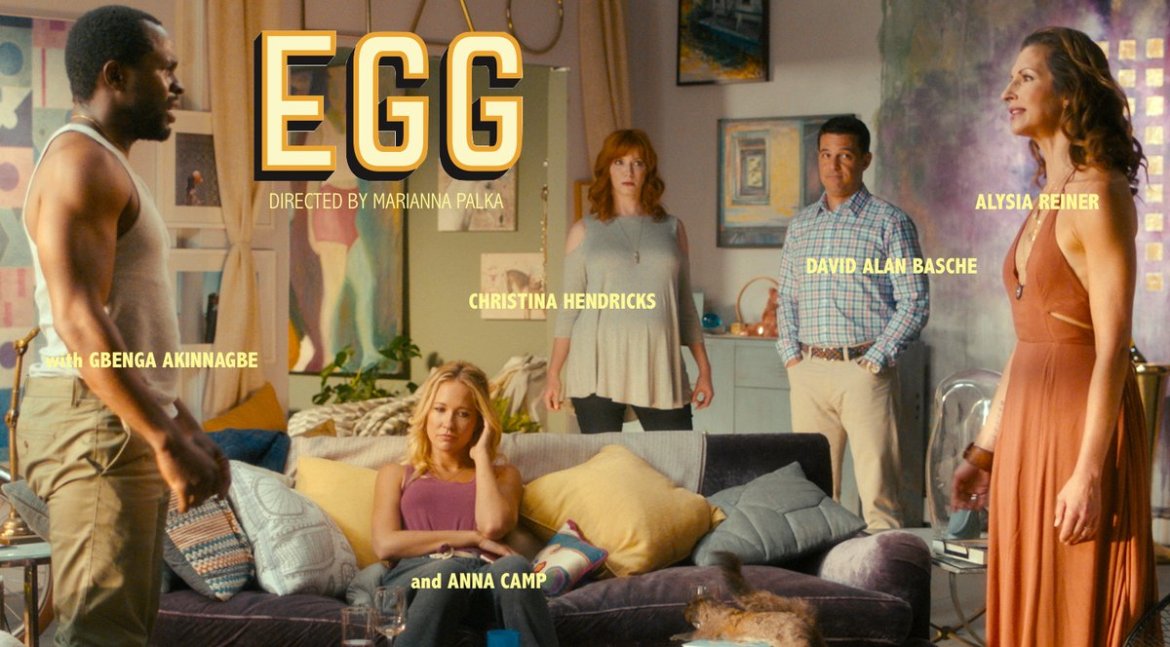Marianna Palka’s deeply dark chamber comedy Egg explores issues of motherhood, female friendship, and social constructs during a single, brutally funny, equally uncomfortable afternoon party. Conceptual artist Tina (Alysia Reiner) and her husband Wayne (Gbenga Akinnagbe) are having a small get-together with Tina’s old art school friend Karen (Christina Hendricks), pregnant and now married to Don (David Alan Basche). Falsely friendly at first, the party soon devolves into a cauldron of animosity and reproach, as Tina criticizes her friend’s comfortable suburban life and Karen looks askance at Tina’s “bohemian” lifestyle.
The crux is Tina’s revelation that she and Wayne are going to have a baby via a surrogate, their friend Kiki (Anna Camp), who wants to be pregnant but doesn’t actually want to have children. The decision sparks a war of words in which the two women square off, unite, and separate again as they debate patriarchal structures and the role of motherhood, traditional and non-traditional, while the men carry on a battle of their own at the peripheries.
Egg is incredibly funny and incredibly uncomfortable, made all the more so as the viewer’s alliances shift from line to line and scene to scene. The animosity between the couples is evident from the outset—Don worries about leaving his Cadillac SUV parked on the “dangerous” streets of Tina and Wayne’s neighborhood, and laughs condescendingly at everything Tina says, while Wayne constantly sneaks off to take shots and chat with Kiki. What motherhood means and how women understand their relationships to the children that they have, or don’t have, becomes increasingly fraught, and the film endorses no single worldview, instead presenting it with a constant shifting of tone that sometimes infuriates.

Both Tina and Karen are attempting to navigate their roles within and without patriarchy, admitting to feelings of inadequacy as they age, the romance and fetishization of motherhood, and the possibility of their partners’ infidelities. The men are thoroughly mocked; their desperation to hang on to their patriarchal roles becomes increasingly ridiculous, and even the apparently progressive Wayne seems to be more invested in traditional roles than he pretends. This is exacerbated with the late introduction of Kiki, probably the character least well-served by the narrative, relegated to the role of the dim-witted bimbo that the men circle around as the only woman who truly occupies her prescribed role as mother and whore combined. But the unhappiness of these characters, their discontent with the roles imposed on them by the culture and by each other, seethes so intensely and with such little satisfaction, that Egg begins to feel both incredibly uncomfortable and all-too real.
Egg’s central exploration of motherhood and femininity comes to a head when Tina and Karen go to look at Tina’s conceptual piece “Egg,” an art exhibition she’s preparing. As the women move through the room, among images of babies from Tina’s friends, children’s toys, renditions of uteruses and vaginas, and projections of baby footage, the meaning of having children within contemporary society becomes ever more complex. Egg isn’t really about the positives or negatives of having children, but about the requirements placed on men and women based on their choices, how women are forced to occupy certain roles—Kiki gives a run-down of a woman’s life “stages” that highlights more forcefully the violence of patriarchy than anything else before or after—and how society (and men in particular) balk when they fail to fulfill their parts. Don is somewhat disgusted by motherhood, Wayne fetishizes it; Tina and Karen both want and don’t want to be mothers, but are aware of what motherhood and the lack of motherhood means on contemporary society.
Egg isn’t entirely successful—the treatment of Kiki comes off as mean-spirited, reducing her to a stereotype when it has taken such pains to develop every other character. The film’s ending feels unsatisfactory, given everything that came before, but I can’t think of an ending to such an angry, tense film that would actually satisfy. In some ways, Palka has presented herself with an insoluble problem, an exploration of a topic which, given the parameters of the film, can never truly satisfy. Egg achieves no catharsis, but can be read as a companion piece to Palka’s previous film Bitch, about a wife and mother so beaten by the requirements of patriarchy that she breaks down and begins to behave like a rabid dog. As a chamber piece brimming with vicious humor and barely contained fury, Egg is enduring, frightening, and deeply troubling.
Egg premiered at the Tribeca Film Festival on April 21.
